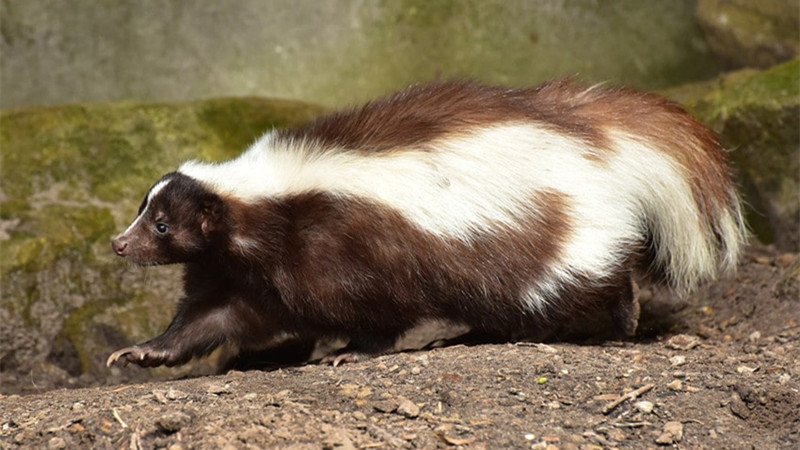It’s no secret that skunks can be a real annoyance to any homeowner, especially for those that own a yard. Not only can they make a mess as they ravage your trash and veg beds, but skunks can also carry diseases and viruses. And while you can’t always see a skunk, you’ll most likely be able to smell it.
Unfortunately, skunks are extremely stubborn, and you can’t just shoo them away like cats or dogs. But you don’t have to worry about them, as this article will teach you how to get rid of skunks and reclaim your yard.
Skunks Introduction
Skunks are small furry, black-and-white, animals that are primarily found in the Western Hemisphere. While most skunks are striped, others are spotted or have different swirl patterns on their fur. When it comes to size, skunks are usually similar to house cats and are rarely longer than 18 inches.
Besides their unique appearance, skunks are famous for their unique defense mechanism. More specifically, skunks can spray a liquid with a strong and unpleasant odor from their backside. And while skunks are not aggressive toward humans and other animals, they can still use their ability on anyone or anything that they consider a threat.
As a result, people try to avoid skunks as much as possible, especially during nighttime.
3 Signs You Have Skunks In Your Yard
Encountering a skunk is always a nerve-wracking experience, mostly because they are so unpredictable. However, you don’t have to see one to know that a nearby skunk has chosen your yard as its home. In fact, there are a few telltale signs that you can use to identify a skunk infestation.
1. Ground Depressions
Skunks are omnivorous, meaning that they feed on a wide variety of insects and plants. And while they aren’t picky eaters, skunks are most fond of subterranean foods like roots, worms, and grubs.
But in order to obtain them, skunks have to dig small, round, cone-shaped holes in your garden or yard. Those holes usually measure anywhere from 3 to 5 inches across and have a circular look from the surface.
However, keep in mind that raccoons also love to dig holes when looking for food. But the main difference between the two animals is that skunks are systematic searchers. Simply put, they tend to dig multiple holes in proximity to each other. So if you find anything similar to that, you are most likely dealing with skunks.
2. Droppings
Skunk droppings are tube-shaped and measure around ¼ to ½ inches in diameter. In fact, they are very similar to those of a house cat and come in a variety of consistencies. They can be either dry and flakey, dirt-like, or wet and mushy, depending on the skunk’s diet. Additionally, skunk droppings can contain grass, berries, fur, or any other insects and plant pieces.
Generally speaking, skunks deposit their droppings close to their feeding areas or on the way to their dens. As a result, if you find any droppings in your yard, then there’s a high chance that skunks use it as a feeding ground or as a home. Besides skunk droppings, you should also keep an eye out for urine, as it has a pungent smell and tends to stain hard surfaces.
3. Smell
Last but not least, skunks are infamous for their ability to spray a foul odor. And while they only use the ability when they are startled or attacked, the smell lingers in the air for long periods of time. In other words, the more skunks are in a specific area, the stronger the residual smell will be.
But how do you recognize it? For starters, a skunk’s odor has a strong smell reminiscent of sulfur or rotten eggs. Additionally, since dogs have sensitive noses, they tend to follow the trail and point you right toward the culprit. So if your dog acts weirdly around your yard, you can be certain that it has been recently visited by a skunk.
What Attracts Skunks?
If you want to know how to get rid of skunks permanently, you first need to figure out what makes them attracted to your yard. That way, you will be able to remove the source and prevent further skunk invasions. Fortunately, skunks base their decisions on the need for food and shelter, meaning that you can easily find out what brings them to your yard.
1. Food Sources
As previously mentioned, skunks are omnivores and alternate between eating plants and insects, depending on the season. Therefore, any potential food source can attract skunks and transform your yard into their feeding ground. For example, an infestation of grubs or earthworms can quickly become an invitation for skunks.
Similarly, leaves, berries, and nuts are also possible attractions for skunks. As a result, you need to monitor the types of plants that grow in your garden and find out if they are a food source for any unwanted guests. Maintaining your yard and cleaning any fallen leaves will also prevent skunks from snacking in your yard.
And lastly, if you live in an urban or suburban area, your garbage can quickly become an all-you-can-eat buffet for nearby skunks. So make sure that your trash cans have tight-fitting lids and always avoid leaving trash bags by your door.
And since skunks aren’t picky eaters, they might even try some of your pet’s food. Hence, you need to put it away, especially at night when skunks are most active.
2. Shelter
Skunks are always looking for a new, more comfortable, and safer shelter. They usually go for the empty space below decks, patios, and sheds, since predators have a hard time reaching them. Also, keep in mind that one den can easily house more than one skunk.
Therefore, you need to act fast and limit their options for shelter in order to turn them away entirely. You can do that by blocking any holes that lead underground and fencing off your yard. Additionally, you need to keep areas like scrap or woodpiles sealed off completely.
How to Get Rid of Skunks
Although there are many approaches you can try to get rid of skunks, not all of them are that effective. For instance, some repellents will only turn away skunks temporarily, meaning that they will return in a few days. And while some people rely on skunk poison or pesticides, there are other, more humane ways to send those creatures packing.
Home Remedies
Getting rid of a skunk doesn’t have to involve dangerous chemicals and expensive products. In fact, some of the most effective methods involve common household items and foods. The only downside is that you will need to reapply most of the following regularly to prevent further skunk invasions.
-
Chocolate
It may come as a surprise, but chocolate is an effective skunk repellent that people all around the country use. Why? Because chocolate contains theobromine, a chemical that can be lethal for most animals. As a result, skunks can feel very sick after consuming even a small amount of chocolate.
So, you need to cut some chocolate into small pieces and place them near the skunk’s den or feeding area. When skunks eat them, they will experience digestive issues and irritation, which will make them leave your property.
However, make sure to avoid using too much chocolate, as you could end up killing the poor animal. Also, be wary that any neighborhood pets such as cats and dogs may eat the tasty delicacy and fall victim to its effects.
-
Homemade Repellents
Homemade skunk repellents are extremely easy to make and use. You need to start by mixing onions, hot peppers, jalapeños, cayenne pepper, and water in a pot. Then, boil it, strain it, and fill a spray bottle with the mixture. Once that’s done, you can spray the mixture in areas that are frequented by skunks.
-
Pet Urine
Skunks usually avoid territories that have been marked by predators. Therefore, you can use your pet’s urine, especially if you have a dog, to mark your yard. That way, even if skunks currently live in it, they will flee as soon as they smell the scent of a possible predator.
Just remember that you might need to repeat this procedure a couple of times until skunks no longer have any interest in your property.
-
Ammonia
Image source: Pinterest
Ammonia is another effective skunk repellent, as the smell is too off-putting for most small animals. So, just cover a rag in ammonia and leave it around skunk dens and feeding areas. If it goes according to plan, you’ll see the animal leaving your property as fast as it can. However, make sure to keep kids and pets away from the ammonia rag, as it can be harmful to them.
Other Methods
If you are unhappy with the results of previous methods, you can always try a different approach. In fact, some would argue that the following are even more effective than homemade solutions.
-
Solar Ultrasonic Animal Repellent
Image source: Pinterest
Solar Ultrasonic Animal Repellents are solar-powered devices that help homeowners get rid of pests such as skunks and mice. They work by generating an ultrasonic sound, which makes your yard an unpleasant environment for animals.
The device is non-toxic, eco-friendly, and most importantly, safe for both animals and humans. And best of all, the device is quiet, as the human ear is unable to hear the high-frequency sound.
-
Peppermint Essential Oil
Skunks have a very good sense of smell, which allows them to find food. You can use that to your advantage by placing some peppermint essential oil all around your yard and near possible dens. The oil will irritate the skunk’s sense of smell and deter it from nesting in the nearby area. You can find peppermint essential oil, or similar compounds, online or at your local grocery store.
FAQ
1. Can I Kill Skunks Legally?
Depending on where you live, you might face criminal charges if you decide to kill or hurt skunks. Why? Because in most states, skunks are fully protected by law.
Therefore, you should always check your local laws before using lethal traps or poison.
2. Can I Use Skunk Poison?
Even though skunk poison can kill skunks, it can end up backfiring. As a matter of fact, you should avoid using it, as you could hurt or kill any nearby pets, plants, and even humans. And since there are many nonlethal methods to get rid of skunks, you should at least explore those options first.
3. Should I Use Mothballs Against Skunks?
While mothballs can keep skunks away, they are not very effective. In fact, they are highly toxic and could damage the natural flora of your yard. Additionally, mothballs could cause health problems for you and your family.
4. When Are Skunks Most Active?
Skunks are nocturnal, meaning that they are mostly active during the night. It’s also important to mention that skunks don’t hibernate, so they are usually active all year long. However, you are most likely to smell them instead of actually meeting one face to face, as they usually avoid humans.
5. Should I Fear Skunks?
Usually, skunks are not aggressive toward humans, meaning that they rarely attack them. Even so, you should try to avoid approaching skunks, as they can spray you in defense. Also, skunks are susceptible to rabies, meaning that they could bite you and spread the disease.
6. Can I Get Rid of Skunks Permanently?
Getting rid of skunks permanently is very hard, especially if you live in a state where skunks are protected by law. However, frequent use of homemade and commercial repellents should keep them away. And if the problem persists, you can contact pest control companies as they might have better solutions.




